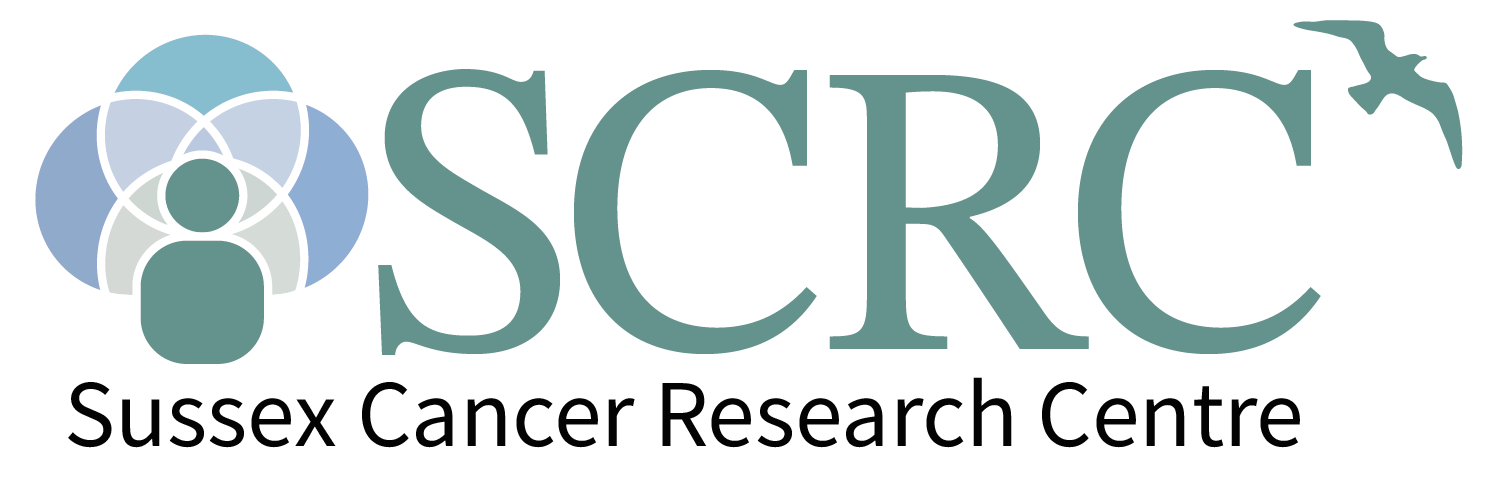
Thanks to the generous support of The Sussex Cancer Fund, The University of Brighton, Brighton and Sussex Medical School, and the University of Sussex, we have made five awards to kick-start exciting new collaborative research projects across Sussex. These diverse research projects span from bench to bedside and all share the potential to unlock new treatment approaches for multiple cancer types.
The SCRC sat down with Megan Wagstaff to talk about her project.
SCRC: Can you share a brief overview of your project?
MW: Our SCRC funded project will focus on the urgent unmet clinical need for targeted and well tolerated therapies in a devastating blood cancer called acute myeloid leuekmia (AML). AML is an aggressive blood cancer with poor patient survival outcomes and is treated with highly toxic chemotherapies which fail to eradicate the disease long term. Therefore, more targeted therapies are required that target specific molecular abnormalities in patients. β-Catenin is a cancer-promoting molecule frequently found at high levels and is overactive in inappropriate areas of blood cells. It’s known to drive aggressive leukaemia’s, worsen patient survival and promote drug-resistance but there are no effective therapies that target the molecule. This project will examine the feasibility of targeting b-catenin stability through a family of enzymes known as ubiquitin-specific proteases (USPs). USPs serve as molecular ‘bin men’ in the cells deciding which proteins are degraded and which are preserved, and we’ve identified several that interact with b-catenin. Our pilot study will improve the understanding of which USPs control b-catenin level and activity, and this could be exploited for novel treatment design in leukaemia.
SCRC: What was the inspiration for your project?
MW: The therapeutic targeting of b-catenin is a long-standing challenge in human cancer research. Its abnormal activity in dozens of human cancers, including AML, has been known for decades yet we still lack a viable targeting drug in the clinic. We were motivated to take on this challenge and a few years ago we mapped b-catenin’s molecular partners in leukaemia cells for the first time. This revealed several critical partners never previously observed for b-catenin before, including specific USPs, which we believe could form the basis for novel therapy design for disrupting b-catenin’s oncogenic activity. The lab is now focused on how these b-catenin partner interactions influence leukaemia development and progression.
SCRC: How do you foresee your project leading to patient benefit? And when?
MW: This pilot study is what you would term a ‘Proof of Concept’ project, meaning quite simply it may work, or it may not. The incredible benefit of a scheme like the SCRC pilot funding is it allows you the opportunity to test a scientific hypothesis which could be used to build a wider scope research study. If the data follows our hypothesis, the results have the potential to benefit the ~80% of AML patients whose leukaemia cells demonstrate some degree of abnormal b-catenin activity. However, direct patient benefit would still be some distance away (perhaps 5-10 years post study) as upon completion of this pilot study a larger follow-on bid would be required to extend the biological and clinical relevance of its findings, translate them into drug design and execute clinical trials. Fortunately, some compounds for targeting USPs already exist which could simplify the drug design phase and pass straight to pre-clinical testing.
SCRC: If the project is successful—what’s next?
MW: This initial discovery phase study will examine the feasibility/safety of targeting specific USPs in leukaemia cells and their impact on b-catenin activity. If successful, the findings will be used to prime a much larger translational drug discovery study incorporating structural, pharmacological and pre-clinical approaches to USP targeting in AML. For this we would seek funding from relevant national funding agencies such as Blood Cancer UK, Medical Research Council or Cancer Research UK. Successful delivery of this project will also greatly support me as a junior researcher by providing me with my first opportunity to manage and lead a pilot cancer research study.
SCRC: Can you describe any interdisciplinary aspects of your projects?
MW: This project benefits from the defining purpose of the SCRC which is utilising multiple institutions across Sussex. Firstly, Universities Hospitals Sussex NHS trust where medical and nursing colleagues collect the essential patient samples necessary to progress our research. We are deeply grateful to local patients who consent for their samples to be used in our studies which increases the impact and relevance of our research. Brighton & Sussex Medical School and the School of Life Sciences at the University of Sussex provide the necessary expertise and resources from Dr Rhys Morgan (Wnt signalling and AML, Professor Timothy Chevassut (AML samples and biology) and Dr Ethan Morgan (USP and cancer biology).
SCRC: What do you think are the main challenges we face in cancer research? How does your project help to address this?
MW: One of the greatest challenges in cancer research is developing therapies that specifically eradicate the tumour cells, in particular cancer stem cells, whilst sparing normal healthy tissues thus reducing toxicity. This project will adopt a new way of targeting a key protein known to generate and maintain cancer stem cells (b-catenin), whilst also assessing the likely impact of targeting USPs on normal healthy blood cells.
SCRC: How have research mentors benefited your research?
MW: My research would not be possible without my laboratory supervisor Dr Rhys Morgan, his guidance has been invaluable as a mentor and in providing expertise, knowledge and critical feedback. Secondly Dr Ethan Morgan’s expertise and advice has been critical in driving this project forward with ideas for future experiments.
SCRC: If people want to follow you and your team or get updates as the project progresses, where can they get more info?
MW: Info can be found here:
Lab websiteX @meganwagstaff
Support life-changing research
Your support has an enormous impact on our research, transforming what we are able to do. Together we have the potential to transform the lives of cancer patients. With your support we are working to discover cutting-edge treatment approaches, that are both kinder and more effective.
We have parntered with the Sussex Cancer Fund to ensure your donations support life-changing research here in Sussex.
If you want to discuss your donation contact us.



